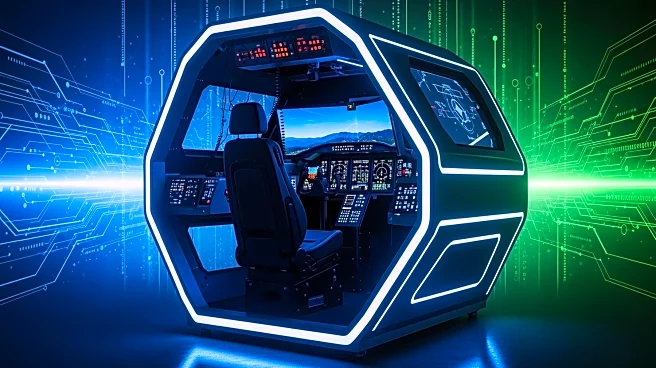What's Happening?
TRU Simulation + Training Inc., a subsidiary of Textron Inc., has announced a significant agreement with the US Aviation Academy for the purchase of five Cessna Skyhawk Veris Virtual Reality Simulators.
This deal, revealed during the National Business Aviation Association – Business Aviation Convention & Exhibition (NBAA-BACE), marks TRU Simulation's first fleet order for VR training devices in the fixed-wing market. The US Aviation Academy, a prominent institution for pilot training, will integrate these simulators into their training programs at their Denton, Texas facility. The simulators are designed to meet FAA Flight Training Device level 7 standards and feature advanced Garmin G1000NXi avionics, providing a realistic training environment. The agreement also includes an option for the Academy to purchase ten additional units in the future.
Why It's Important?
This development is significant for the aviation training industry as it introduces advanced virtual reality technology into pilot training programs, potentially revolutionizing how pilots are trained. The use of VR simulators can enhance the learning experience by providing immersive and realistic scenarios, which can improve pilot readiness and confidence. For the US Aviation Academy, this agreement represents a commitment to adopting cutting-edge technology to maintain its status as a leading training institution. The broader aviation industry may see increased demand for similar VR training solutions, which could lead to advancements in pilot training methodologies and standards.
What's Next?
The US Aviation Academy is expected to begin integrating the VR simulators into their training programs, which could set a precedent for other training institutions to follow. As the simulators are delivered and utilized, feedback from instructors and trainees will likely influence future developments in VR training technology. Additionally, TRU Simulation may pursue further agreements with other aviation training centers, expanding the use of VR simulators across the industry. The company also anticipates EASA qualification for the simulators later this year, which could open up international markets.
Beyond the Headlines
The introduction of VR technology in aviation training raises questions about the future of traditional flight training methods. As VR becomes more prevalent, there may be discussions about the balance between virtual and real-world training experiences. Ethical considerations regarding the reliance on technology for critical skills training could emerge, as well as debates on the cost-effectiveness and accessibility of such advanced training tools.








